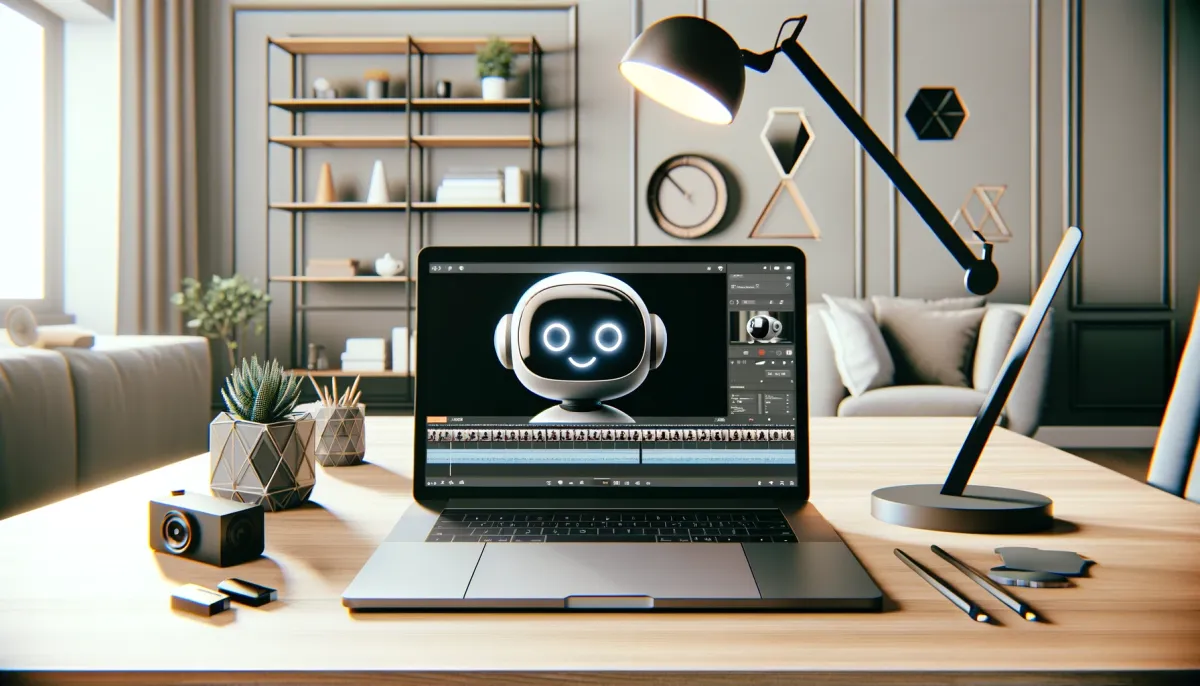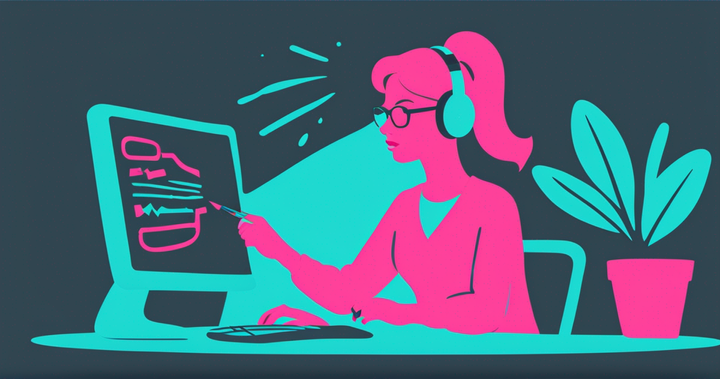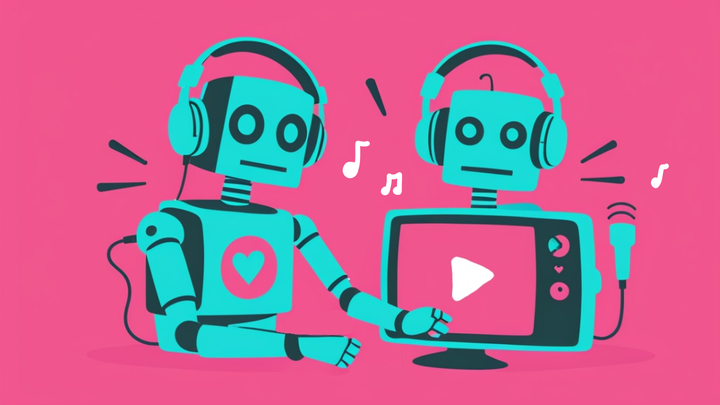New Data: AI Is Already Being Embraced by Video Creators
We surveyed video creators to better understand how AI is affecting their work. Here's what the data says.

Over the last year, it seems like AI’s been part of every conversation, from product launches to pop culture discussions.
We can’t seem to stop talking about AI. It’s changing every aspect of our lives—including how we make video. But, there hasn't been much data supporting how AI is changing video.
So, we decided to do the research ourselves.
We asked video creators and producers to share how AI is currently affecting their work, how they think it will change video production in the future, and how they feel about AI’s place in video creation in general.
Before we dive into the details, here’s the TL;DR:
- Video creators are optimistic about AI. We saw overwhelmingly positive sentiment toward the use of AI in video creation. In general, people consider AI to be a great tool for both productivity and creativity. See the data →
- AI tools have already seen wide adoption. Current adoption of AI tools in video creation workflows is already high. Buy-in from leadership doesn’t seem to be a major barrier for most teams/professionals; they’re already all in on AI. See the data →
- Automated tools are valuable; generative tools have potential. While there’s plenty of excitement around and adoption of current AI tools, there’s still lots of green space for new tech to fully meet the expectations of video teams. See the data →
Now, let’s take a closer look at the data.
Current perception of AI in video production
AI can be a divisive topic and it's rife with uncertainty. We started our research by taking a quick pulse check on how video creators and producers feel about AI—what we found was mostly positive.
People believe the future of AI in video is bright
The overwhelming majority, 79%, of our respondents feel at least cautiously optimistic about the future of AI in video. Only 16% feel nervous.
We thought that larger companies, constrained by multiple layers of stakeholders, might be more hesitant about artificial intelligence. But it’s actually smaller companies that are more likely to feel cautious about the future of AI in video.
79%, of respondents feel optimistic about the role AI will play in video creation.
People think AI makes video producers more creative
Most respondents don’t think AI will replace all or even most video production jobs in the coming five years. Good news for video editors and creators.
Even better news: 76% of respondents said they think AI will make video producers more creative.
The top-cited reason for this increase in creativity was that “AI automates tedious tasks.”
Current adoption of AI in video production
AI-powered video creation isn't a theoretical future; it's happening now. 69% of our survey respondents have used AI in video production in the past six months.
We asked that group additional questions to understand how they’re using AI, how it’s meeting (or failing) their expectations, and its overall effect on their video creation process.
How are video production teams using AI currently?
AI-powered subtitling and transcription tools are the most commonly used AI tools in video production, with 66% of respondents using them. Scriptwriting, brainstorming, audio editing, and voiceover are close runners-up.
Larger companies are slightly more likely than smaller companies to use AI tools for subtitling, scriptwriting, and voiceovers. But beyond that, the frequency of different use cases for AI tools doesn’t vary significantly based on company size.
The automation of tedious tasks seems to be universally appealing.
What’s stopping teams from using AI more in their video production?
Most respondents cite quality or accuracy as their biggest challenge when adding AI into their video production process. For this study, quality is defined as “meeting brand standards” and accuracy is defined as “not requiring additional review or fact-checking.”
Given those definitions, managers are nearly twice as likely to cite quality as their main concern.
63% of smaller companies are most concerned with quality and accuracy when working with AI in video, but only 36.4% of larger companies cited that as their main challenge. In fact, larger companies were just as likely to consider cost and ease of use as their biggest concerns.
Less than 2% of all respondents, across company sizes, cited buy-in from leadership as a major concern. Upper management and high-level stakeholders aren’t the bottleneck.
Productivity and creativity go hand in hand
There’s been a lot of discussion over the last year or so about how AI will affect creative industries, from writing to acting to video production. This mostly boils down to whether AI is good or bad for creatives.
While we can’t definitively answer that, our data does speak to some of the underlying concerns.
First, there’s a lot of trepidation around AI replacing creative jobs. For most respondents, AI has not fully replaced human tasks in video production, nor do most of them think that it will in the future. 48.5% think AI could replace some video production jobs; we believe that repetitive, tedious tasks are most likely to be automated.
Rather than making video producers obsolete, AI is making it easier for them to do their jobs. 90% of respondents feel AI tools increase their productivity while creating video.
90% of respondents feel AI tools increase their productivity while creating video.
The second major concern with AI is that it will diminish creativity. As said above, over three-quarters of our respondents think AI increases creativity. But decision-makers are even more keen on AI’s creativity-boosting power.
While team managers report increased productivity with AI at around the same rate as other respondents (91%), they’re 10% more likely to think that AI increases creativity. It's possible the time teams are saving on tedious edits with AI is instead being spent on concepts and creative storytelling.
Is generative AI meeting current expectations?
Generative video tools promise the ability to create a video from a text prompt. But do they deliver on that promise?
Currently, no.
74% of respondents said the current capabilities of generative AI video tools fail to meet their expectations, but most can see the potential of these tools and are excited about what generative AI will eventually be able to do. Only 6% think generative AI is overhyped.
About a quarter of respondents said that generative AI tools mostly meet expectations. However, only 6% of respondents publish their AI-generated videos without manually editing or tweaking them. That gap means even users who are happy with the output from generative tools expect to have to edit them in some way before they’re ready to publish.
The future of video creation and AI
So, where do we go from here?
It’s clear there’s a huge demand for AI video tools and an expectation this tech will increase both productivity and creativity. And while most people don’t expect (or want) AI to take over video production entirely, they are looking for greater accuracy and quality from their AI tools. Currently, generative AI isn’t fully meeting those expectations, which means there’s a lot of green space to build on.
Of course, no one can predict the future with exact precision. But our best guess at what it will look like? High-quality tools that automate tedious tasks, enable creativity, and make video production more accessible to professionals from any background.
Create content faster with Kapwing's online video editor →








